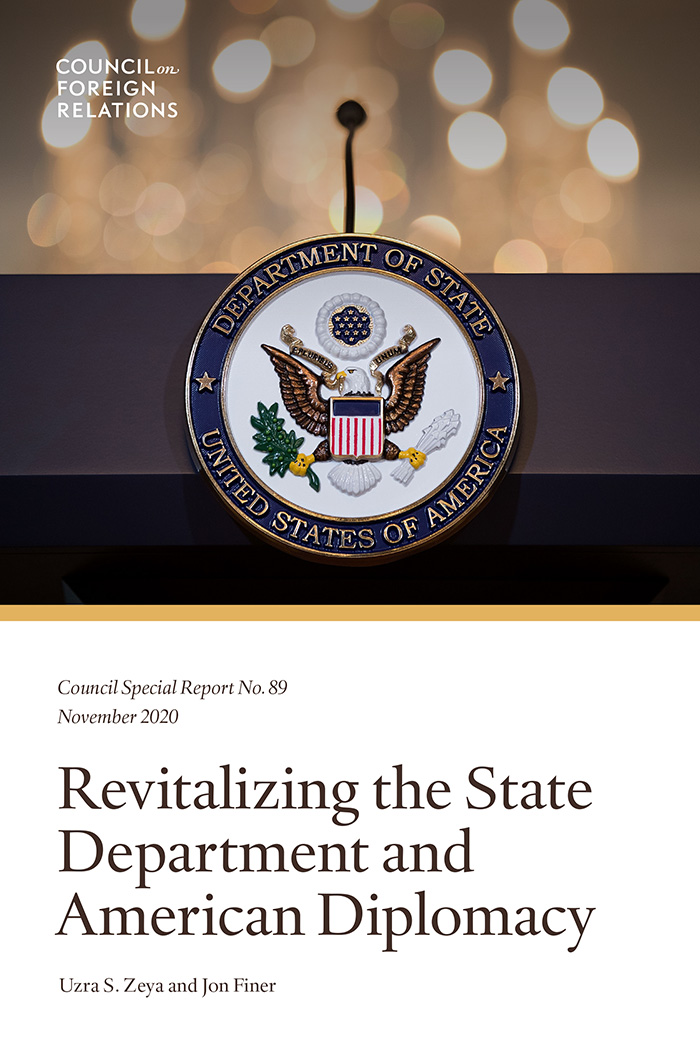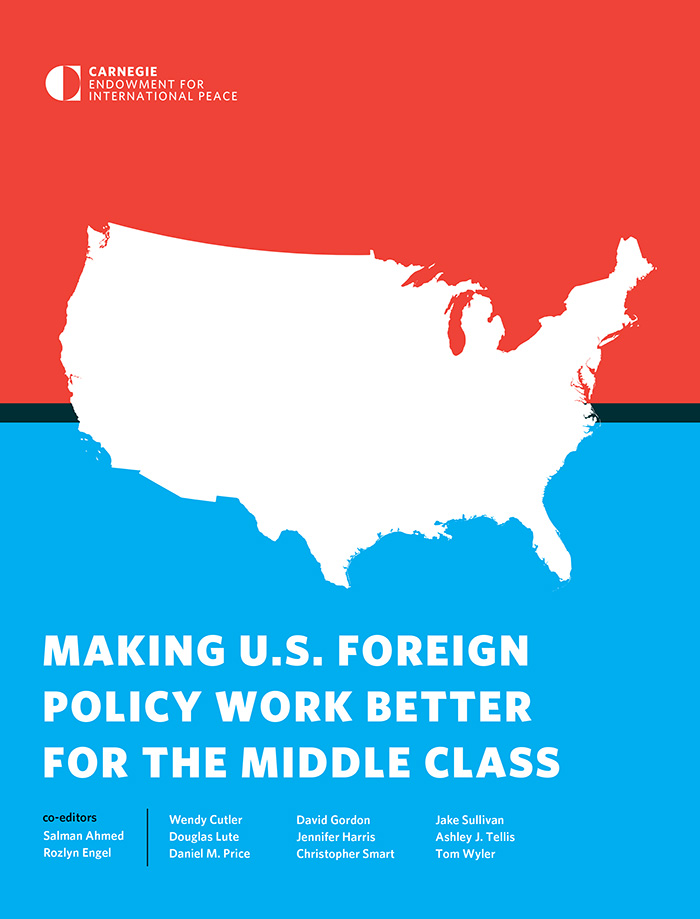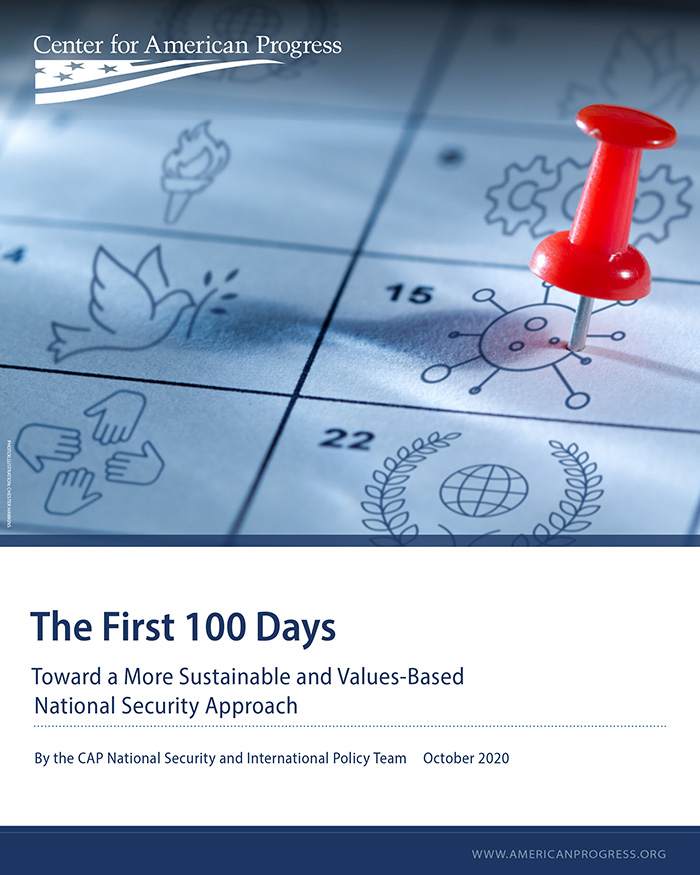On Boosting U.S. Diplomacy and National Security: Three New Reports

REVITALIZING THE STATE DEPARTMENT AND AMERICAN DIPLOMACY
By Uzra S. Zeya and Jon Finer
Council on Foreign Relations
Council Special Report No. 89
November 2020
This report and set of proposals (summarized here) are based on input from an advisory committee of experienced former Foreign Service and Civil Service officers and State Department political appointees from both parties, led by Ambassadors William J. Burns and Linda Thomas-Greenfield. The report also drew from previous reports and recommendations from the American Academy of Diplomacy, the American Foreign Service Association, the Atlantic Council, the Stimson Center, the U.S. Commission on Civil Rights and the U.S. Government Accountability Office. The following are excerpts from the overall introduction, the introductions to each of the main policy areas (with the specifics in each policy area listed in italics), and the conclusion.
The role of the State Department has received heightened attention amid the onslaught it has suffered under the Donald J. Trump administration, which has treated American diplomats and diplomacy with a mix of neglect and disdain. But many of the challenges facing the DOS have existed for decades. … The most pressing challenges facing the State Department include a 21st-century policy environment that has, in some priority areas, evolved beyond the core competencies of most Foreign and Civil Service officers and an institution hollowed out by three years of talent flight, mired in excessively layered structure, and resistant to reform.
Perhaps most important, they include the multigenerational challenge of a diplomatic workforce that falls woefully short of reflecting the diverse country it serves, particularly at the senior-most ranks. … The State Department today risks losing the “war for talent,” not only to the private sector but increasingly to other government agencies, due to inflexible career tracks, self-defeating hiring constraints, and a lack of commitment to training and professional development. Finally, DOS is hampered by Congress’ failure over many years to pass authorizing legislation, leading to budgetary pressures and diminishing DOS’ status in the hierarchy of national security agencies. …This report does not speak to every challenge the State Department faces but rather highlights the reform areas that we identified as reflecting greatest need based on discussions with veteran diplomats and other experts.
Statecraft
For diplomacy to remain the foremost tool of American foreign policy, the State Department should be appropriately postured against the range of emerging national security threats and opportunities the nation faces. … The State Department should therefore develop—both within the Foreign and Civil Service and by bringing on board top outside practitioners—greater expertise in the range of issues that will be essential to American leadership in the 21st century. … The following critical areas are intended to reflect not so much top policy priorities as issues that will shape the decades to come and for which DOS is currently inadequately postured:
- Climate Change
- Pandemic Disease
- A Global Diplomatic Footprint That Matches Shifting Global Power
- Economic Competitiveness, Equity, and Anticorruption
- Technological Transformation
Institutional Reform: Seismic Culture Shifts Needed
No matter how many new Foreign and Civil Service officers are hired or how much funding for the International Affairs Account is increased, asserting State Department leadership in shaping a disrupted world will not be possible without seismic culture shifts within the institution. This means decisive and long-overdue action to make the State Department a diverse, equitable and inclusive institution. … Institutional transformation also requires moving away from an ingrained risk-aversion mindset, careerism, bureaucratic layering that tangles the Washington decision-making process and hyper-politicization of diplomacy that has inflamed perennial political appointee-career divides, hollowed out senior career ranks and tanked employee morale and recruitment numbers.
- Diversity as a National Security Priority
- Overcoming Risk-Aversion Culture
- Delayering and Decentralizing Decision-making
- Restoring Trust and Bridging the Career-Noncareer Divide
Workforce: Open Pipeline, Revolving Door, and Minds
With more than half of Foreign and Civil Service employees having less than ten years of experience, domestic Civil Service staffing frozen at 2017 levels and a brain drain of senior talent since 2017, urgent attention needs to be devoted to revitalizing the professional path and retention of the current DOS workforce. … Mindful of the sensitivity of career officers who advanced national security under significant hardship under the Trump administration, a “right of return” (within limits) would be beneficial, focused on those who left the State Department in the last ten years.
- Greater Flexibility and Enabling Return (alternative entry paths, replace bidding process, revise or replace “cones” system, streamline evaluation process)
- Rebooting and Expanding Training and Continuous Learning (training float, long-term study, recruiting for language)
Beyond the Near Term
The foregoing recommendations are intended as a road map for an administration from either major party to implement in 2021, requiring nothing more than decisions by a Secretary of State. … But American diplomacy and the State Department would also benefit from some longer-term thinking, even if those goals are more difficult to accomplish.
- Amend the Foreign Service Act
- Unified National Security Budgeting
- Diplomatic Reserve Corps
Conclusion
The Department of State remains a world-class diplomatic institution that employs thousands of the U.S. government’s most capable public servants. But left unaddressed, the challenges that DOS faces risk causing irreparable damage to America’s standing and influence in the world, ability to advance its interests overseas, and security and prosperity at home. … Prioritizing reform, even in the face of competing demands, is among the most enduring contributions that could be made to American security and prosperity and is essential to equipping American diplomacy for the issues the country faces. … Building a constituency for diplomacy and diplomats—not unlike that which exists for U.S. military institutions and personnel—would be a worthwhile, if generational, project. In the meantime, an administration less hostile to diplomacy than the current can begin reversing the present crisis in its early days by implementing long-overdue changes under existing authorities. Transformation, not restoration, should be the Secretary of State’s mandate.

MAKING U.S. FOREIGN POLICY WORK BETTER FOR THE MIDDLE CLASS
Co-edited by Salman Ahmed and Rozlyn Engel
Carnegie Endowment for International Peace
In 2017 the Carnegie Endowment for International Peace established a Task Force on U.S. Foreign Policy for the Middle Class to identify the elements of a new foreign policy that can more adequately meet domestic policy requirements, in particular one that can simultaneously address the precarious state of the American middle class—arguably the bedrock of America’s power—and protect U.S. interests and ensure effective U.S. leadership around the globe.
Members of the task force were Wendy Cutler, Douglas Lute, Daniel M. Price, David Gordon, Jennifer Harris, Christopher Smart, Jake Sullivan, Ashley J. Tellis and Tom Wyler.
Over a period of two years the group carried out three in-depth analyses of distinct state economies in America’s heartland—Colorado, Nebraska and Ohio—that included hundreds of interviews. The case study findings contain valuable insights that, while not the typical raw material for foreign policy making over recent decades, are essential to grasp in fashioning an effective policy going forward.
The following is excerpted from the report summary.
If there ever was a truism among the U.S. foreign policy community—across parties, administrations and ideologies—it is that the United States must be strong at home to be strong abroad. Hawks and doves and isolationists and neoconservative alike all agree that a critical pillar of U.S. power lies in its middle class—its dynamism, its productivity, its political and economic participation, and, most importantly, its magnetic promise of progress and possibility to the rest of the world.
And yet, after three decades of U.S. primacy on the world stage, America’s middle class finds itself in a precarious state. …
If the United States stands any chance of renewal at home, it must conceive of its role in the world differently. … Five broad recommendations bear highlighting up front.
First, broaden the debate beyond trade. Manufacturing has long provided one of the best pathways to the middle class for those without a college degree, and it anchors local economies across the country, especially in the industrial Midwest. … But debates about “trade” are often a proxy for anxieties about the breakdown of a social contract—among business, government and labor—to help communities, small businesses and workers adjust to an interdependent global economy. … Getting trade policy right is hugely important for American households but it is not a cure-all for the United States’ ailing middle class. …
Second, tackle the distributional effects of foreign economic policy. Globalization has disproportionately benefited the nation’s top earners and multinational companies and aggravated growing economic inequality at home. … Making globalization work for the American middle class requires substantial investment in communities across the United States and a comprehensive plan that helps industries and regions adjust to economic disruptions. …
Third, break the domestic/foreign policy silos. For decades, U.S. foreign policy has operated in a relatively isolated sphere. National security strategists … have articulated national interests and set the direction of U.S. policy largely through the prism of security and geopolitical competition. … But threats to the nation’s long-term prosperity and to middle-class security demand a wider prism—informed by a deeper understanding of domestic economic and social issues and their complex interaction with foreign policy decisions. … It will take better interagency coordination, interdisciplinary expertise, and some policy imagination.
Fourth, banish stale organizing principles for U.S. foreign policy. There is no evidence America’s middle class will rally behind efforts aimed at restoring U.S. primacy in a unipolar world, escalating a new Cold War with China, or waging a cosmic struggle between the world’s democracies and authoritarian government. In fact, these are all surefire recipes for further widening the disconnect between the foreign policy community and the vast majority of Americans beyond Washington, who are more concerned with proximate threats to their physical and economic security. …
The United States cannot renew America’s middle class unless it corrects for the overextension that too often has defined U.S. foreign policy in the post–Cold War era. It is equally evident that retrenchment or the abdication of a values-based approach is not what America’s middle class wants—or needs. … All this requires a larger international affairs budget to retool American diplomacy and development for the 21st century. …
Fifth, build a new political consensus around a foreign policy that works better for America’s middle class. A foreign policy that works better for the middle class would preserve the benefits of business dynamism and trade openness … while massively increasing public investment to enhance U.S. competitiveness, resilience, and equitable economic growth. It would sustain U.S. leadership in the world, but harness it toward less ambitious ends, eschewing regime change and the transformation of other nations through military interventions. …
The task force’s recommendations provide a blueprint for rebuilding trust. So much of what is required to make U.S. foreign policy work better for the middle class … will require working through difficult trade-offs, where the interests of industries, workers, or communities do not align. The American people need to be able to trust that U.S. foreign policy professionals are managing this tremendous responsibility as best they can, with the interests of the middle class and those striving to enter it at the forefront of their consideration.
U.S. foreign policy professionals will also need to regain the trust of U.S. allies and partners, which no longer have confidence that the deals struck with one U.S. administration will survive the transition to the next. …
Restoring predictability and consistency in U.S. foreign policy requires building broad-based political support for it. … The ideas in this report represent a starting point for discussion—one that will hopefully lead to healthy debate and bring many more innovative and actionable ideas to the table.

THE FIRST 100 DAYS: TOWARD A MORE SUSTAINABLE AND VALUES-BASED NATIONAL SECURITY APPROACH
By the CAP National Security and International Policy Team Center for American Progress
Oct. 19, 2020
In January 2020 the Center for American Progress set out to consider what a progressive national security agenda could look like in the next administration, whether a new Biden administration or a second Trump administration. The organization convened experts to consider concrete ways to advance progressive ideas in the first 100 days.
The following are excerpts from the report’s introduction and summary. The full report contains a chapter on each of five “pillars,” with detailed recommendations in each, as well as substantive appendices. The report is supplemented with an interactive database containing some 250 recommendations from the report that users can sort and review by topic, type of action, and relevant agency, office or official responsible for their execution.
Over the past several months, the CAP National Security and International Policy team worked to develop an actionable plan that could serve as a roadmap for the early days of a willing administration—the first executive actions, human capital and budget investments, and policy initiatives. We identified five key pillars of action that not only reflect the reality of the world that the next administration will confront but also the progressive values that are necessary to put the United States on a more principled and sustainable path internationally:
- Rebuilding and modernizing our national security institutions to provide the tools and resources necessary to meet today’s national security challenges.
- Living our democratic values at home and abroad and prioritizing the defense of those values.
- Ending the current wars responsibly and leading with diplomacy—not military action—to resolve conflicts.
- Recalibrating our global relationships, including with U.S. allies, competitors and adversaries.
- Tackling global challenges such as climate change, migration, arms control, corruption and building a new multilateralism that advances the collective good.
As CAP built this 100-day plan, we were mindful that the line between domestic and foreign policy is no longer as stark as it once was. This plan touches on what necessary steps the United States must take at home to put it on a stronger footing in the world, including investing in its economic competitiveness, strengthening its democracy and taking bold steps on climate change. CAP will continue to deliver additional bold, progressive ideas in these areas in the months ahead. …
Rebuilding and Rebalancing Our National Security Tools and Institutions. … Recommendations to rebuild and restore trust in our national security institutions and rebalance our national security tools to end the cycle of overreliance on the armed forces to manage problems that should be handled by civilian agencies.
Living Our Democratic Values. Protecting human rights and upholding democratic values has been a perennial goal for U.S. presidents of both major political parties. … The next administration must take immediate steps to reverse harmful policies and halt human rights violations in U.S. domestic and foreign policy, demonstrating through words and deeds a renewed commitment to living our values.
Ending the Wars Responsibly. Despite conflict fatigue at home, ending direct U.S. military involvement will not “end the wars” and will lead to profound consequences for innocent civilians. A more responsible approach will require a commitment to lead with diplomacy, enhance transparency and develop a more sustainable and resilient approach to ongoing threats, including terrorism.
Recalibrating U.S. Global Relationships. America’s international reputation has suffered greatly from the current administration’s abandonment of alliances, disregard of democratic values and mishandling of the COVID-19 pandemic. The next administration will need to make a concerted effort to rebuild relationships with democratic allies and partners, offering a new vision for global engagement with democratic values at its core. The following chapter provides recommendations to restore democratic partnerships, compete more effectively with adversaries and recalibrate relationships to fit today’s challenges.
Tackling Global Challenges. Climate change, unprecedented human migration, new technologies and an ongoing pandemic are just some of the issues the next administration will face from its first day in office. Working with international partners to tackle these problems will be essential to achieving meaningful progress. The next administration will need to return to multilateralism—with renewed commitments to rebuild the trust that was lost over the past four years—to tackle this growing list of global challenges.
Read More...
- “Blue-Ribbon Blues: Why So Many Great Reports and Good Ideas Go Nowhere,” by Harry Kopp, The Foreign Service Journal, September 2018
- “The Future of the Foreign Service—As Seen Through the Years,” from the FSJ Archive, September 2018
- “American Diplomacy at Risk: A Report from the American Academy of Diplomacy,” by Ronald Neumann, The Foreign Service Journal, July-August 2015




